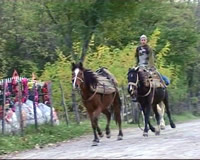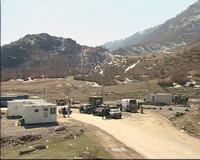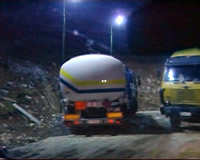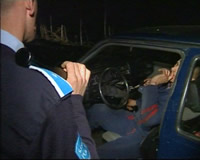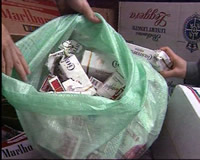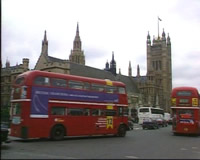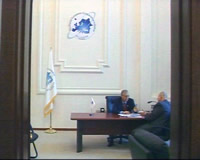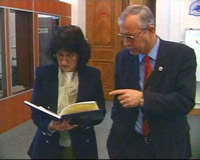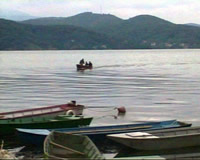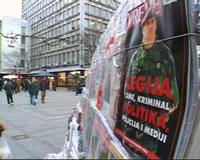| In the mountains between Kosovo and Montenegro, horses and donkeys are the traditional means of transport. Today, they are still used intensively to carry all kinds of goods, mostly smuggled across the border zone which has become a haven for traffickers. The police discover fresh horse tracks. And in this car, all the equipment needed for petrol smuggling. This man admits that he earns up to 500 euro a day, selling petrol illegally. | |
| Even real petrol stations have set up in this no man's land. Their owners pay tax to no-one. | |
| Long queues for cheap petrol on both sides of the border have turned this place into the most interesting duty-free zone in Europe. | |
Interview Allan Clarke, UNMIK Border Police
`It's difficult because we have a unique situation here. We are on an administrative boundary line, and it's not officially a border. So it creates difficulties for us.`
The difficulties are obvious and in spite of frequent controls, smuggling remains THE source of income for many people, while Kosovo and the region remain hot spots on the map of international crime. | |
Interview Ramush Tahiri, Adviser to the Kosova Assembly President
`I don't think that Kosovo and the Albanians are the source of crime. What we have here is a transit zone. So they are the middlemen.`
| |
No matter where the source is, organized crime spreads out from the region. It is estimated that about one thousand tons of smuggled cigarettes cross the Adriatic Sea every month ending up on the European market.
| |
| The port of Ancona in Italy is an important control point on the Adriatic route. Cigarette smuggling involves inter-connected chains, sometimes linking the producers all the way down to street dealers. In fact, the amount of cigarettes legally imported into some Balkan countries would suggest that every citizen smokes about 17.000 cigarettes a day. | |
| But more terrifying than cigarettes, is the traffick in human beings. In a single raid, the Belgrade police found 46 jailed Moldovan women and the resources human traffickers need- weapons, money and fake documents. This flourishing business is becoming as profitable as drugs trafficking. Instead of getting a promised job and a better life abroad, thousands of women end up forced into prostitution in the Balkans or in Western Europe. Every year, 200.000 women are trafficked through the Balkans on their way to big European cities. Another Balkan route is used by drug traffickers to bring narcotics from Asia to Europe. | |
Here in Great Britain, officials say that gangs from the former Yugoslavia and Albania control 70 % of the heroin market. Faced with this growing threat, representatives of 57 countries gathered in London last November to draw up a common strategy to crack down on criminal networks, which are seriously poisoning relations between Balkan countries and the international community. | |
Upsound Jack Straw, British Foreign Secretary
`We can only defeat the scourge of organized crime if we tackle it together` Interview Javier Solana, EU High Representative for Common and Security Policy `You can imagine that a country of which the people don't have the perception that it is a country under rule of law, a country that is run by institutions or by mafias, by groups of organised crime, criminals, …that country will never get money from the international community, the investors will not have trust, …`
Interview Alessandro Buttice, European Commission Anti-Fraud Office
`The geographical position of the Balkans between the EU, Eastern Europe and the Middle East, is a crossroads for cross-border smuggling.` | |
The geographical position is one thing. But wars in the region have also created fertile ground for organized crime. Macedonia managed to avoid a major conflict in 2001, but the country still has to cope with the criminal gangs who took root during these tensions. Interview Boris Trajkovski, President of Macedonia `We have to face the fact that the speed of our integration into Euro-Atlantic structures will depend on our own efforts and results in combating organised crime. Let's be serious, we cannot be partners nor negotiators with the EU and NATO if we don't deal with this properly.`
| |
| The Macedonian police recently took action against sex trade gangs that have for a long time been untouchable. Political will is the key in the fight against crime, but it is impossible to achieve results by acting only at national level. This workshop where all kinds of fake documents, visas and passports are produced demonstrates how criminals operate: internationally. For them, borders are no obstacles. | |
International crime needs an international response. In Bucharest (Romania), this building which used to be the symbol of the Ceaucescu regime is now the focal point for regional anti-crime action, under the framework of the Stability Pact. Under one roof are found the Pact's Organised Crime unit, a connection to Interpol and the SECI centre for fighting cross-border crime.
Customs officers and policemen from 12 Southeast European countries work together here. Their main goal is the swift exchange of information within the region. The head of this center is Turkish. This demonstrates the need to share information on a wider scale in Europe's Southeastern corner.
| |
Interview Yalcin Cakici, Head of the SECI center
`When we look at the map of the region we see that Turkey is gateway from Asia to Europe. In the old days it was used for trade purposes. But nowadays it is used by criminals.`
| |
Interview Ferenz Banfi, Deputy Head of the SECI center
`Most of the national law enforcement agencies have one type of information, but if this information is dispersed or divided or if we are not able to combine it, it means that we are not able to investigate the whole criminal network.` Exchange of information is only the first step. What really counts, is the number of criminals put behind bars. With different legislation still in place in different countries, criminals remain at large. What is considered evidence in one country might not be recognized in an other. This is one of the main goals of the Stability Pact. It encourages the countries of the region to harmonize their laws, and offers best practice to upgrade the fight against organized crime.
| |
Interview Gabrijela Konevska, Stability Pact Initiative against Organized Crime `Nobody is going to give you a testimony or to be a witness in front of any court if he or she doesn't have enough protection for that. Because after that if you don't have a protection program your life and life of people around you can be in big danger.` | |
Porous borders in the Balkans still cause more trouble for the police than for the criminals. As a natural border between a number of countries, the Danube is one of the ideal places for illegal border crossing. This group of illegal immigrants was arrested in Croatia last autumn. As long as mafia gangs have better regional cooperation than the police, the fight against organized crime will not be successful, says the head of the Croatian police.
| |
Ranko Ostojic, Head of the Croatian Police
`The criminal comes from Bosnia and Herzegovina, commits a crime in Croatia, and then flees to Yugoslavia. The concrete situation is: in BiH they are happy that the criminal has gone, in Croatia we don't have any record about this criminal, and in Yugoslavia he's spending his money so they are also not motivated to arrest him there.`
| |
In March 2001, the Belgrade police discovered 600 kilos of heroin in a bank safe: a special deposit made by the police itself, when Milosevic was still in power. The heavy legacy of a regime, in which the dividing line between state and mafia gangs was blurred, has finally been brought to light. The heroine has been destroyed. But the ashes of crime remains. On Belgrade newsstands, headlines scream of mafia leaders and former warlords settling scores. This shows that Balkan countries will need more time, political will and international support to heal their societies, and truly move forward. | |
 Facebook
Facebook Twitter
Twitter

